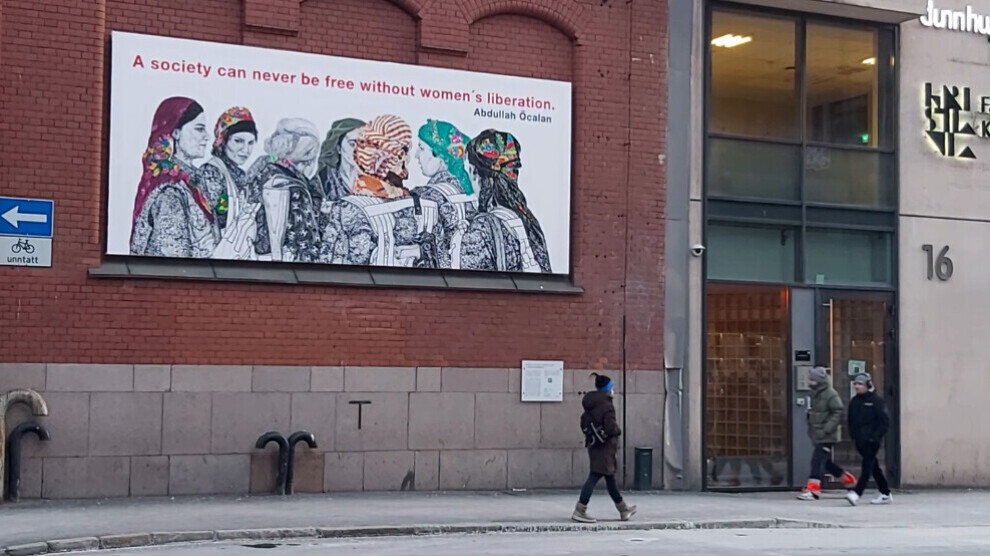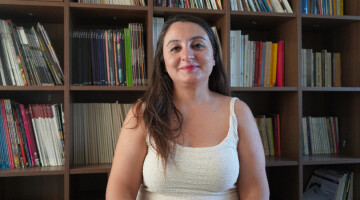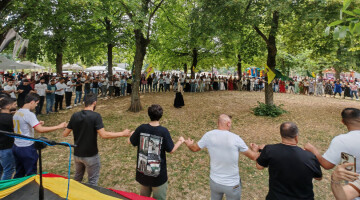The Cultural Committee of the Oslo City Council has unanimously rejected Turkey's demand to remove a mural depicting a quote by Abdullah Öcalan on women's liberation. The painting by artist Gelawesh Waledkhani opposite the Norwegian parliament remains despite massive threats.
Committee Chair Eivor Evenrud made public a day before the meeting that she has been receiving death threats for weeks. "A few weeks ago I wrote here that the Municipality of Oslo will NOT remove a work of art, even if the Turkish Foreign Ministry and the Ambassador in Oslo asked us to do so. Then it went off," the Rødt politician wrote on Twitter. "It took 15 minutes before the first death threat came. I assumed that someone would get angry, but I wasn't prepared for the amount of anger and threats. It's a painting on a wall in Oslo!"
The threats came around the clock and there were a lot of them, the tweet continues, "Finally, I almost think it was just funny. But it's not really, it's terrible. It shows what people, especially the Kurdish population, go through all the time. Here in Oslo, I got help from the right authorities. Freedom of expression is the cornerstone of a well-functioning democracy."
The mural, which measures around two and a half meters by six meters and is entitled "Rojava: The Women's Revolution," was created by the artist Gelawesh Waledkhani in 2020. It depicts Kurdish women fighters in northern Syria and contains the famous quote by Abdullah Öcalan: "A society can never be free without women's liberation”. The mastermind of the Kurdish liberation movement is considered the source of ideas for the Rojava revolution. The art wall on which the painting hangs is run by the Mesén Cultural Agency. The public exhibition venue is based on the idea that art on display in museums is always reserved for an initiated audience. The project is also intended to contribute to the promotion of freedom of expression and public debate.
The Turkish Foreign Ministry in Ankara had demanded the removal, accusing the Oslo municipality of "supporting terrorism." In addition, the ministry issued a threat: "We would like to remind those who tolerate terrorism that they, too, may one day be affected by this scourge."
Fear of art
This is not the first time that Turkey has interfered with artistic freedom outside its own borders. Erdogan's lobby in Germany also intervenes regularly. About a year ago, the city of Nuremberg had a picture by photographer Laurence Grangien removed from the exhibition "ROJAVA: Appearance and Reality" under pressure from the Turkish consul general. The photo showed a Kurdish woman from northern Syria with a machine gun next to a flag of the Parastina Jin and the image of Abdullah Öcalan. In the autumn of 2018, an art exhibition in Duisburg was under police protection after massive threats because of a picture critical of Erdogan. The painting by artist Thomas Baumgärtel, known as the "Banana Sprayer," showed Turkish President Recep Tayyip Erdogan in a bent-over position with his bare buttocks covered in a banana.
In 2016, the Turkish government wanted to remove a picture by photographer Demir Sönmez from an open-air exhibition in the Swiss city of Geneva. On it was a banner blaming Erdogan for the death of a minor. "My name is Berkin Elvan, the police killed me on the orders of the Turkish prime minister," the banner read. Berkin Elvan was 13 when he was fatally shot by a police gas canister during the Gezi protests in June 2013.
RELATED NEWS:















